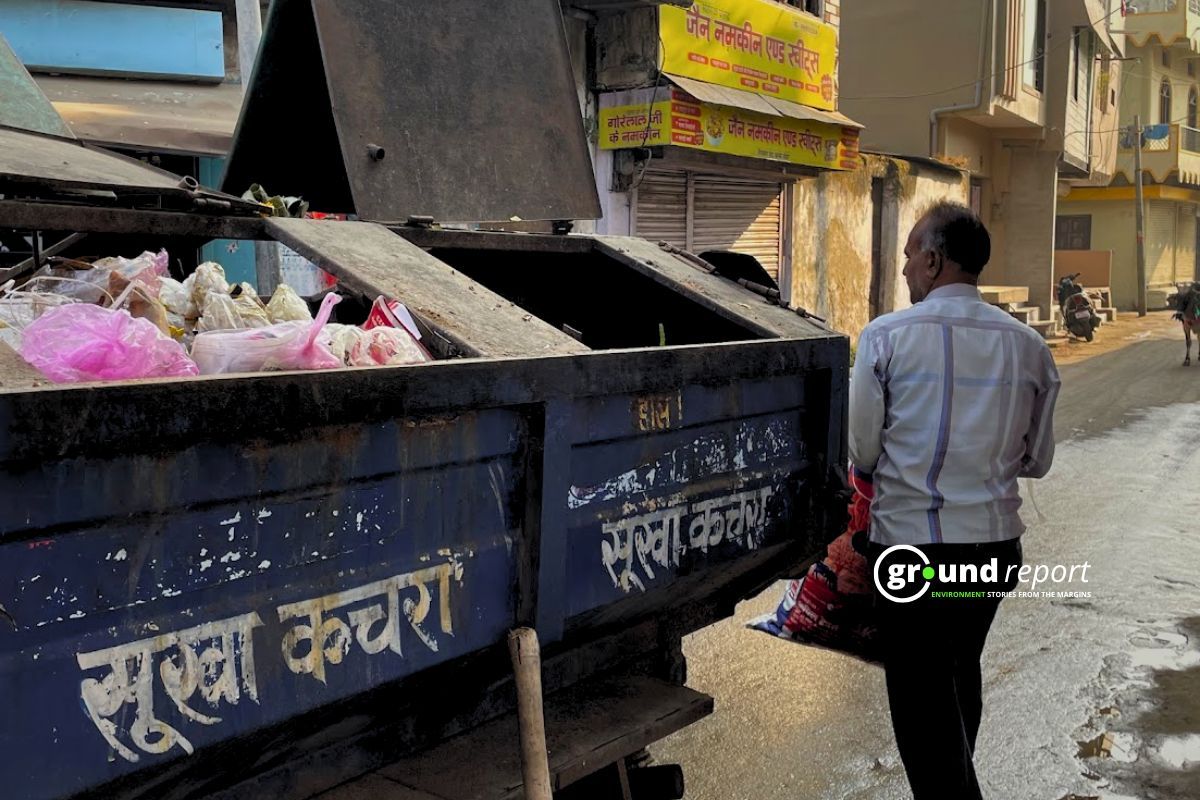Every morning at six, a team of men assembles at the Sehore Nagar Palika (municipality) in Madhya Pradesh. These waste collectors navigate the city’s bylanes in their vans, collecting garbage from households.
Among them is 45-year-old Ashok Prajapati, who has been a waste collector since 2014. Prajapati explains his daily routine– Each day, he arrives at the municipal office, gets his vehicle keys, and begins his route, collecting garbage from his assigned neighbourhood.
Prajapati allows this reporter to accompany him in his garbage van, offering an inside look into the daily experiences of ‘Safai Mitras‘—the sanitation workers responsible for the timely collection and disposal of municipal solid waste from the city homes.
The daily routines of the city’s Safai Mitras are filled with challenges. Despite their critical contributions to urban cleanliness and public health, these workers often face social discrimination, economic hardships, health and safety risks. Their efforts may go unnoticed by mainstream society, leading to the neglect of their rights and well-being.
“I am responsible for collecting garbage from three wards– 34-35 and 25, starting my work promptly at six in the morning” shares Prajapati.
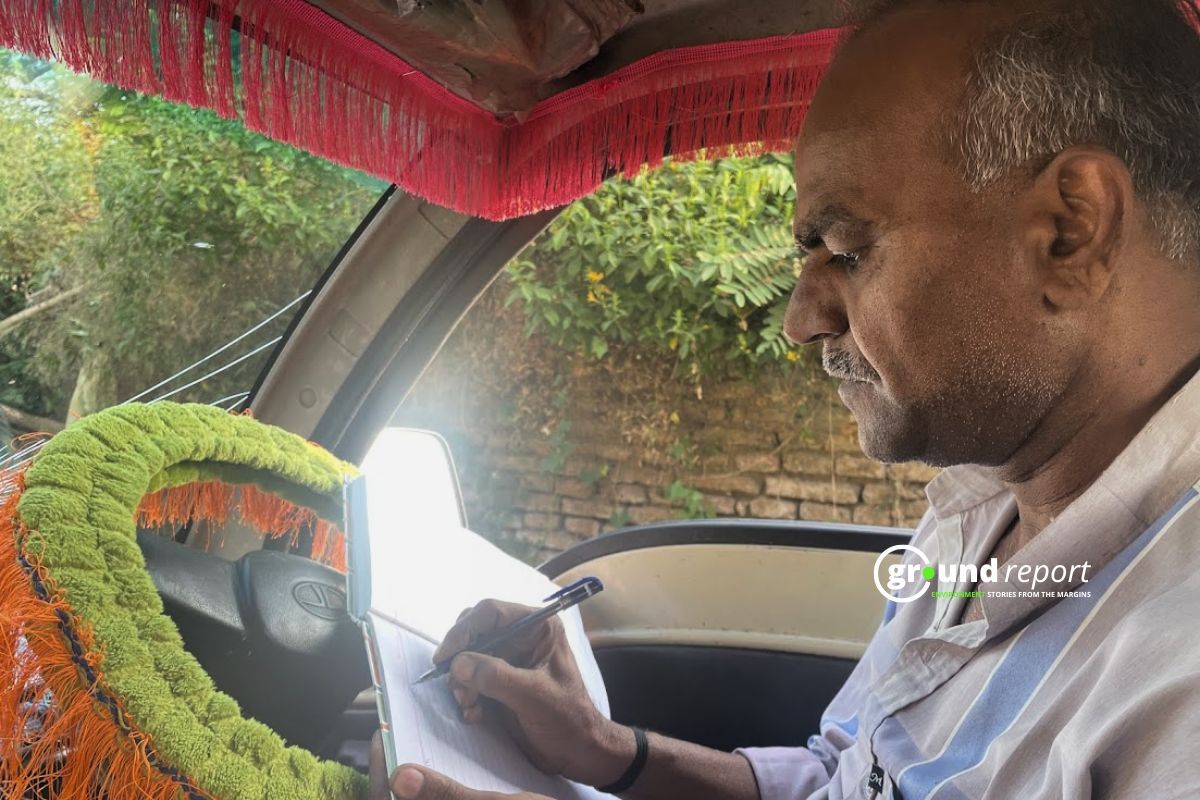
Each day, upon reaching his first ward number 34, he activates the speaker mounted on his garbage vehicle, which plays the Hindi jingle “Gaadi wala aaya ghar se kachra nikaal,” translating to “The garbage vehicle has arrived; take out the trash from your home.” This catchy tune, penned by Shyam Bairagi from Mandla district in Madhya Pradesh, has become synonymous with waste collection services in various Indian cities, alerting residents to bring out their household waste.
After collecting garbage from all three wards, Ashok Prajapati, a father of five, arrives at the disposal site outside the city at 2 p.m. to empty his vehicle. Despite dedicating eight hours each day to his work, he earns a monthly salary of ₹10,772.
“In this era of inflation, it is difficult to run the house with such a low salary. I have a big family; I have to look after their education and also arrange my elder daughter’s marriage,” he shares.
A resident of Indore Naka, he has been a driver since 1990, initially operating passenger buses. In 2014, when a recruitment drive was announced by the municipality, he applied, unaware that the position involved driving a garbage vehicle. Nonetheless, he accepted the job, considering it a government position with the potential for permanency in the future.
“I started this job for ₹6,000 a month. Ten years have passed, yet I haven’t been made permanent, nor has my salary increased significantly. We continue this work, hoping that once we are made permanent, we’ll receive benefits like pension and provident fund,” he laments.
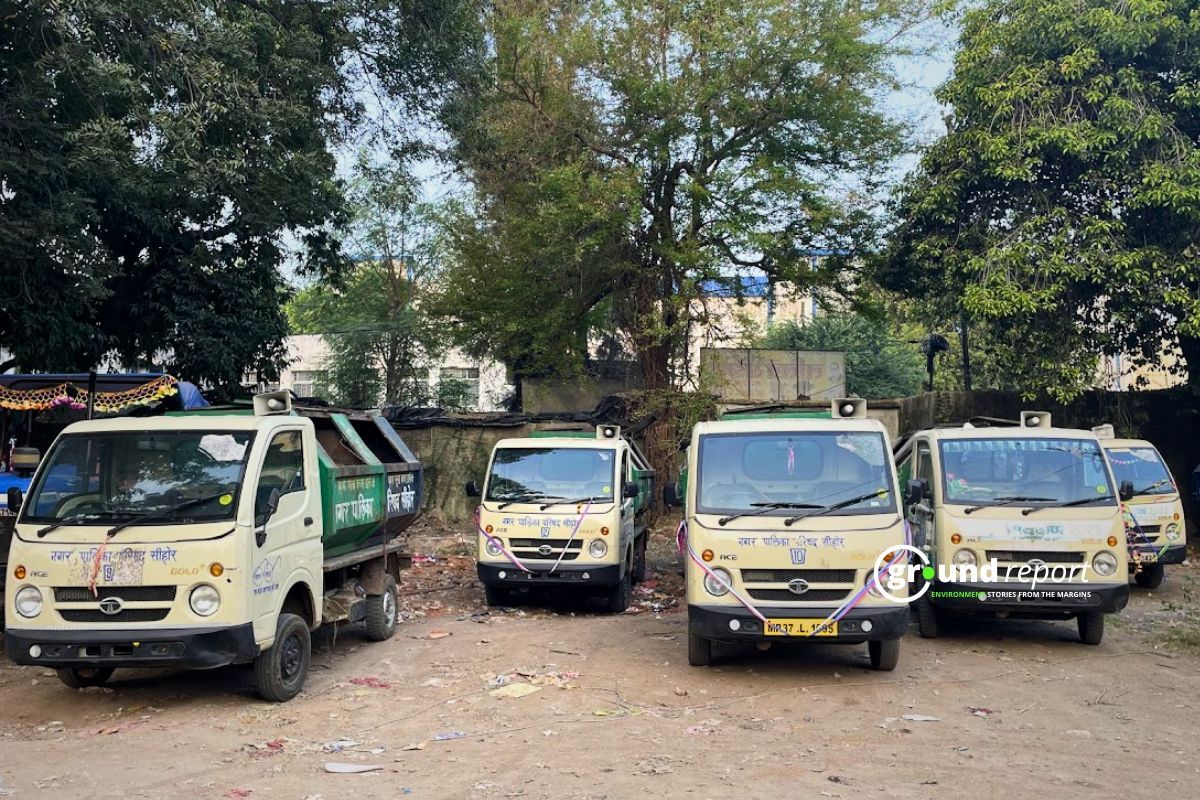
Sehore Municipality operates 32 vehicles for door-to-door waste collection, staffed by 24 drivers. Among them, six are new recruits earning ₹8,000 per month, while the remaining drivers, employed since 2014, receive ₹12,000 per month. Nagar Palika President Prince Rathore states, “We are paying salaries to Safai Mitras as per the collector’s guidelines.”
In Madhya Pradesh, highly skilled workers are paid 11 thousand rupees, skilled workers are paid 10 thousand rupees, semi-skilled workers are paid 9 thousand rupees and unskilled workers are paid 8 thousand rupees per month. The work of a driver comes under the category of skilled worker, but despite this, new drivers are taking the salary of the unskilled category.
On Wednesday, 7 August 2024, Madhya Pradesh Chief Minister Mohan Yadav had decided to regulate sanitation workers in urban bodies from 2007 to 2016 by making them permanent. According to the order of the General Administration Department, more than 15 thousand sanitation workers in the state will benefit from this decision. This order also mentions increasing the salary of sanitation workers from 8 thousand to 18 thousand. Along with this, there is also a provision to give a job on compassionate grounds to the family member in case of death during the job and to give retirement 5 years earlier in case of serious illness.
However, in Sehore, these benefits have yet to be implemented. When Nagar Palika President Prince Rathore was queried about this delay, he stated,
“When the order comes, it will be complied with here too.”
People’s behaviour
As Prajapati navigates his van in the narrow lanes of Sehore’s Ward 35, residents gradually emerge from their homes to dispose of their waste. “In Sehore, many residents are not accustomed to separating wet and dry waste, leading them to mix all types of garbage when handing it over to the collection vehicle,” he informs. To accommodate the varying types of waste, he frequently disembarks from the vehicle, using a stick to compress the garbage and create more space.
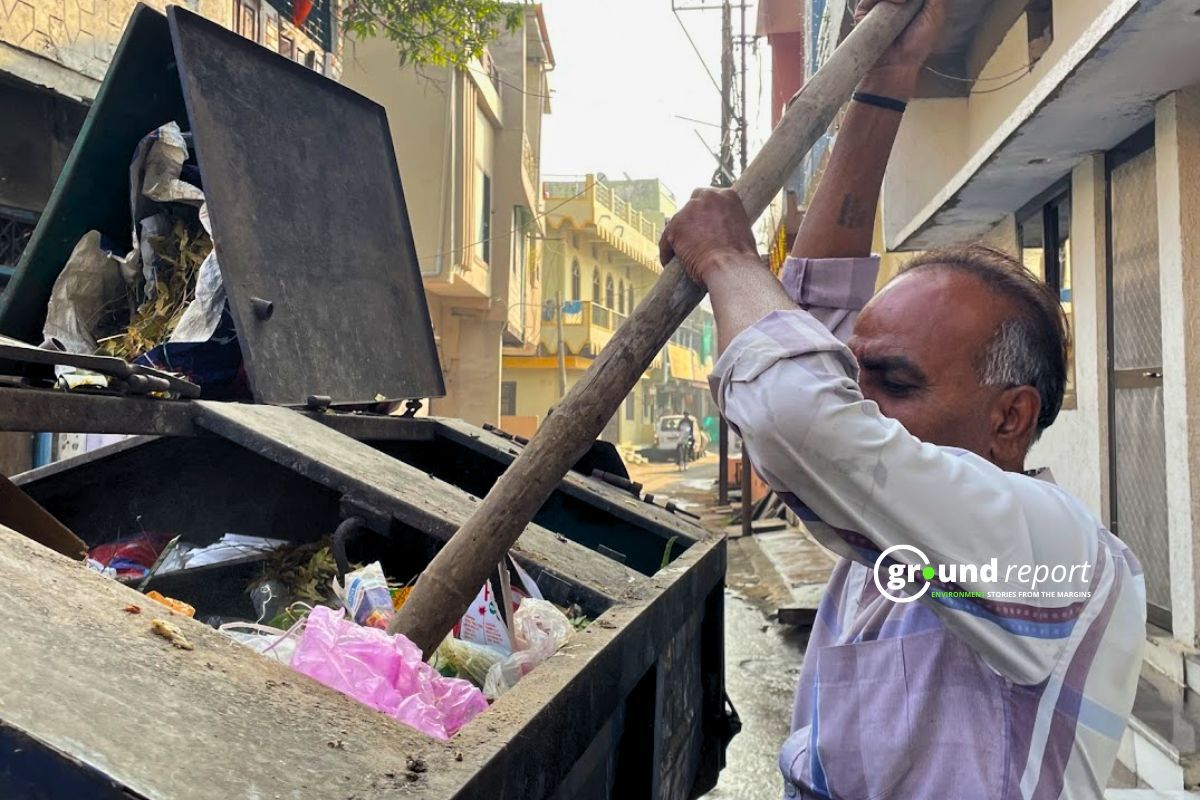
He explains, “Our job is to drive the vehicle. Many times, the garbage falls from the vehicle, and we have to collect it with our hands. People think that this is our job. We are doing the work of two people. If there is even a slight delay, people complain about us.”
As Prajapati navigates the narrow lanes of Sehore, he skilfully manoeuvres the garbage vehicle to reach every corner, despite obstacles like parked vehicles. Residents of multi-storey buildings often dispose of their waste by aiming it directly into the vehicle from above, a practice that can lead to improper waste segregation.
He observes, “Be it sanitary napkins, medicine waste, or construction demolition waste, people mix everything and put it in the vehicle. When this garbage reaches the landfill site, the cleaning staff present there has to separate it manually.”
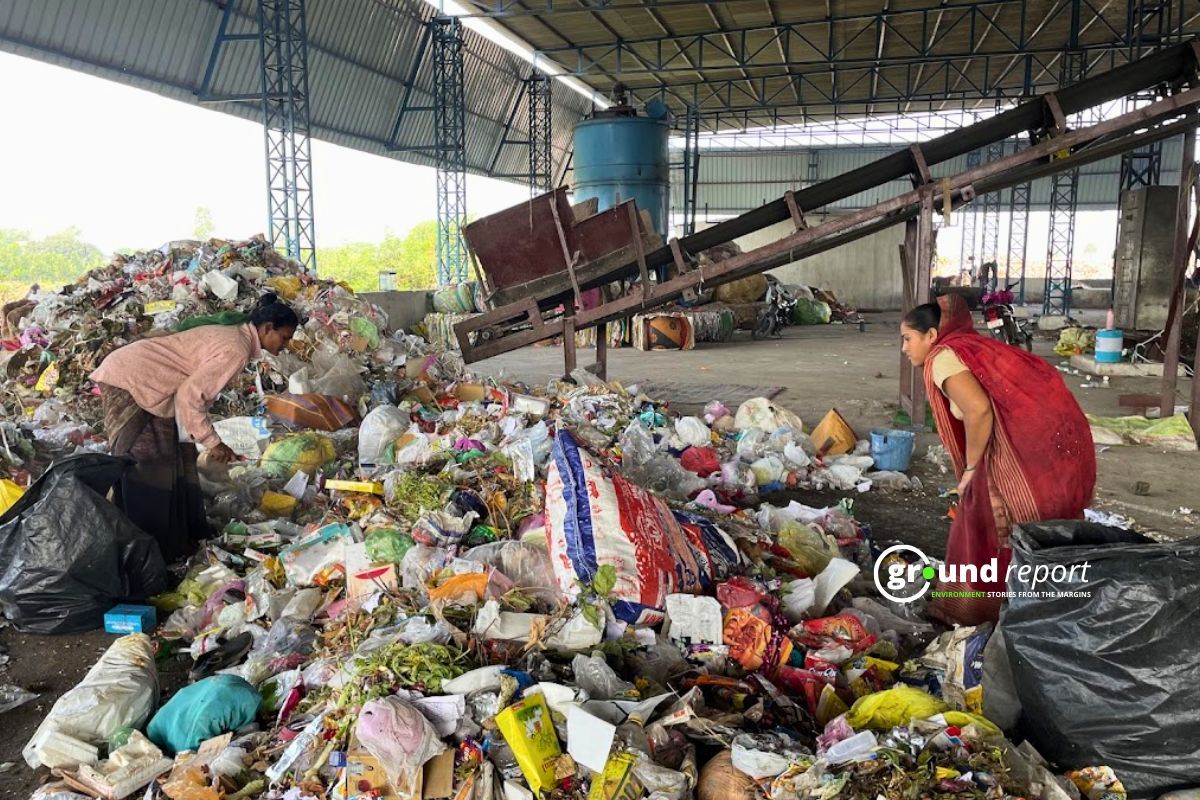
Santosh Malviya, a fellow garbage vehicle driver alongside Ashok, shares his experience:
“People think that this is our work, whereas we are just drivers. Some people also misbehave with us; many times we even have to listen to abuses. This problem occurs more in those localities where influential people live. They even threaten to get us suspended.”
In agreement with Santosh, other drivers collectively express their sentiments.
“Prime Minister Modi respects sanitation workers like us on TV and showers flowers on them, but people here do not treat us well.”
Radheshyam, a recently recruited garbage vehicle driver, shares his perspective:
“People call us ‘Kachre wala’ (Garbage Man); we don’t have any problem with it; we are earning our livelihood by working hard. But people should not look down upon us. If we don’t do this work, then who will clean the garbage from their house?”
However, Prajapati says that “not all people are the same, because we go to these wards every day, so we have developed a relationship with people. Some people know us by name, some people ask about our well-being, and on festivals they also give us sweets or gifts.”
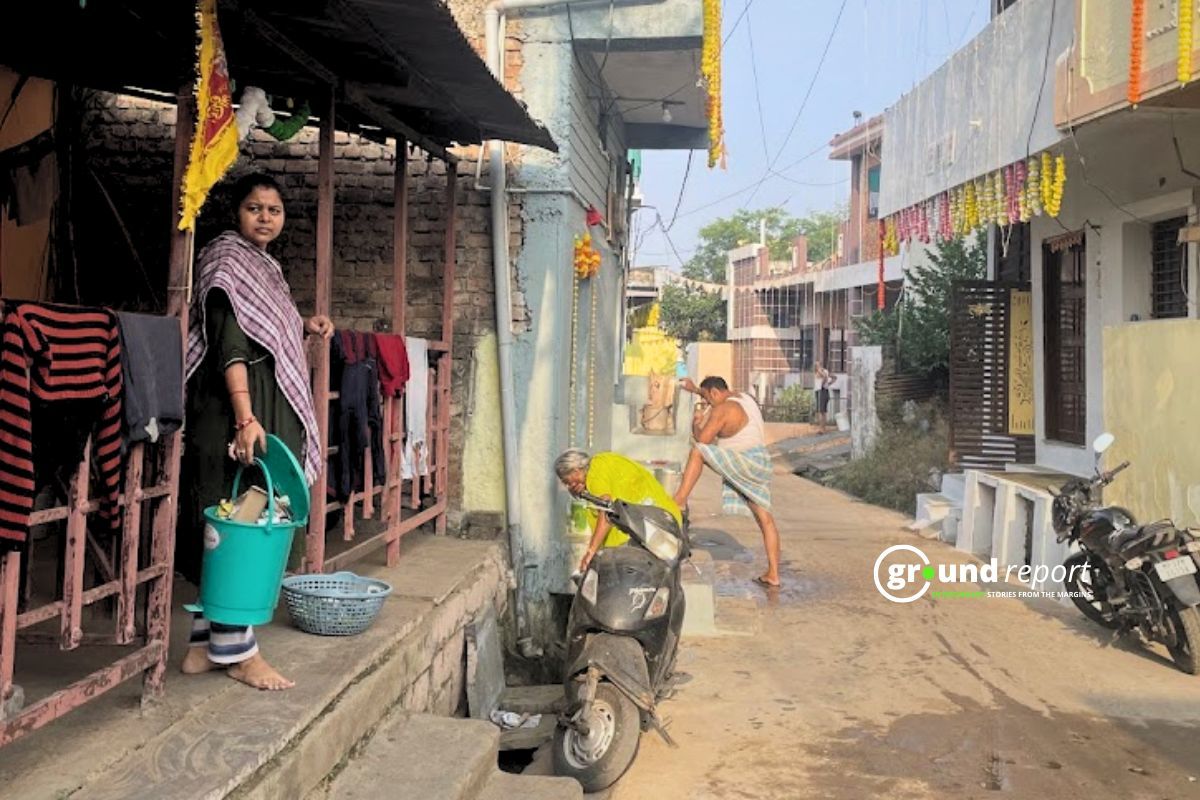
This year on Deepawali, under the Swabhaav Swachhata-Sanskar Swachhata Abhiyan, garbage vehicles were instructed to make three rounds in the localities instead of one. According to the drivers, their work increases during festivals. Be it Sunday, Saturday, or any festival, they have to work every day. Leave is given only on request. They do not get facilities like bonuses on festivals or overtime.
Question of safety
Health and safety are major concerns for sanitation workers, both on the road and during waste separation. They often encounter sharp objects like blades and syringes, leading to injuries. The absence of gloves and other protective equipment increases the risk of serious health issues.
Prajapati recalls receiving gloves as safety equipment 3-4 years ago, which are now torn. He says,
“If nothing else, at least give us a uniform; it will make us feel a little better.”
Prajapati informs that Nagar Palika has taken care of his accident insurance, for which a premium of Rs. 450 is deducted from his salary every month. But there are no facilities like regular vaccinations, health checkups, or health insurance.
On the subject of getting the drivers to do the work of sanitation workers, Nagar Palika President Prince says,
“We are going to give the work of door-to-door collection to a private company; its tender has been issued. In this, there will be an assistant along with the driver who will ensure that people separate wet and dry garbage themselves and put it in the vehicle.”
Hope for a better future and dignified life
While public gestures like political leaders washing the feet of sanitation workers and showering them with flowers are commendable, they often serve as symbolic acts rather than addressing the core issues faced by these workers. Sanitation workers, such as Ashok, Santosh, Radheshyam, and several others in the state, seek recognition as equals, not as objects of charity. They advocate for dignified living through fair wages, social security, and access to safety equipment.
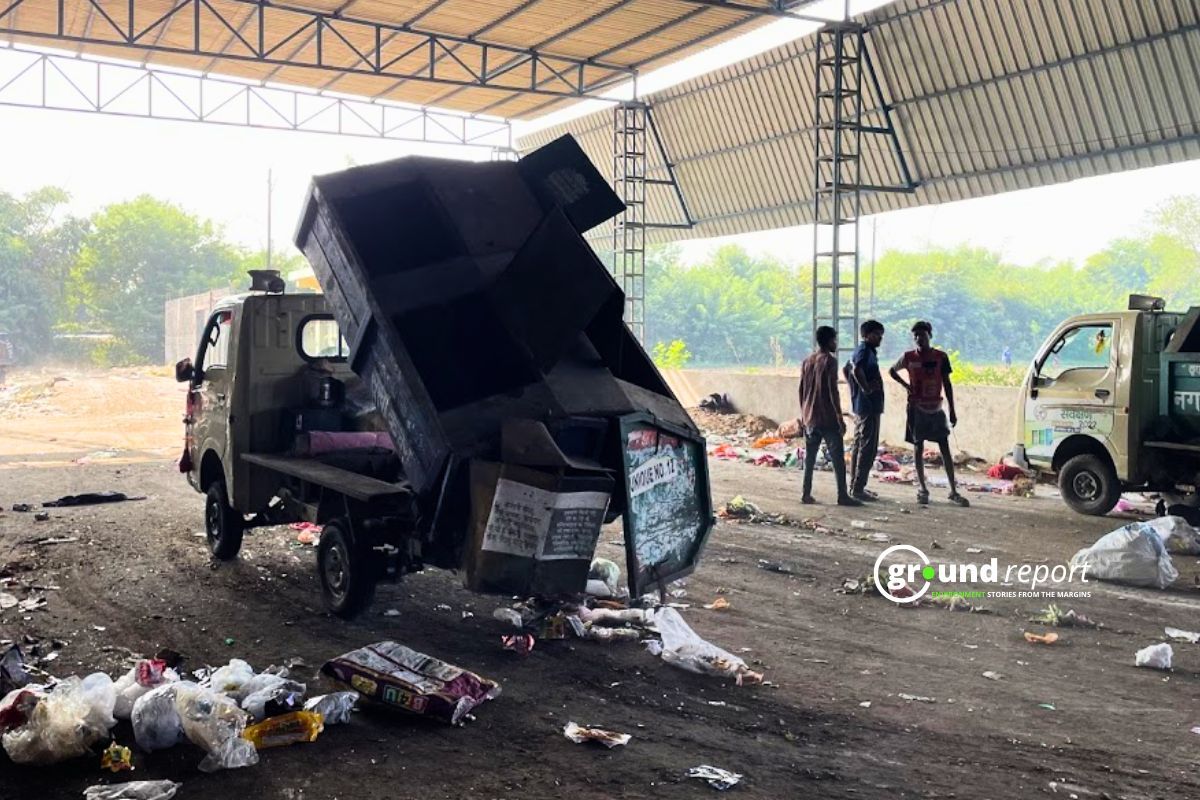
Ashok Prajapati moved to Sehore from his village, Hadli Kalan, seeking employment in 2002. He lives with his wife and five children in a house he built by taking a ₹6 lakh loan. The monthly EMI of ₹9,000, combined with his₹10,000 salary from driving a garbage vehicle, is insufficient to cover household expenses.
To supplement his income, Ashok operates a jhal-muri and sev mixture snack cart near his home from 6 pm to midnight, earning an additional ₹500 to ₹700 daily. He manages to save up to ₹300 from this venture. He feels pride in providing a home for his children in the city but acknowledges the financial strain. He hopes that a modest salary increase will enable him to offer his children a better education and a brighter future.
He further emphasises the importance of job security, stating, “The most important thing is that the government makes us permanent; if this happens, then we will not have to depend on anyone in our old age.” Prajapati reflects on his day’s hard work, expressing a desire for stability and dignity for his family.
Story Edited by Diwash Gahatraj
Support us to keep independent environmental journalism alive in India.
Follow Ground Report on X, Instagram and Facebook for environmental and underreported stories from the margins. Give us feedback on our email id greport2018@gmail.com.
Don’t forget to Subscribe to our weekly newsletter, Join our community on WhatsApp, Follow our Youtube Channel for video stories.
Keep Reading
Selective Cleanup: MP’s uneven firecracker waste management
14 waste-to-energy plants producing 202 MW: Govt in Lok Sabha
Climate crisis intensifies struggle for India’s informal waste pickers
